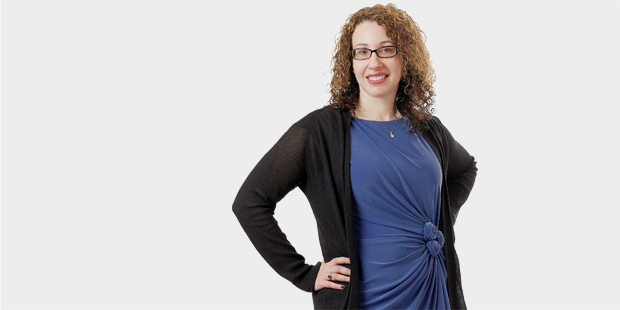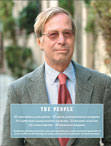Introducing Jeanne Fromer
Professor of Law
Printer Friendly VersionHere are the signs that Jeanne Fromer is a culture junkie: Her vast iPhone application collection takes up two screens with 16 folders each, a dozen apps per folder. She has downloaded more than 7,000 songs, ranging from Adele to Pink Floyd to Vivaldi. She is up on the latest movies and TV shows, and when she walks, her high-heeled shoes flash red, the trademark lacquered soles of highly coveted Christian Louboutins.
By luck or design, Fromer, 37, has made cultural immersion her livelihood. “Staying fresh in copyright law requires me to keep up with contemporary culture. But I like to do that anyhow,” she says. That synergy has become her personal trademark.
Are copyright laws antiquated in an era of streaming videos and downloading music? How does software, an incredibly important but more recent part of the economy, fit into copyright law? Fromer, a rising star in the field of intellectual property law, wrestles with these thorny issues daily. Lecturing in class on the Louboutin lawsuit to prevent Yves Saint Laurent from also selling red-sole shoes, she tackled its key challenge: Is Louboutin’s red sole functional? If so, that would prevent trademark protection under the law’s functionality doctrine.
Fromer is not new to NYU. She was an Alexander Fellow in 2006-07 and a visiting professor in Spring 2012. That fall, she joined NYU Law from Fordham University School of Law, where she began teaching in 2007. One of two scholars to receive the firstever American Law Institute Young Scholars Medal (with Oren Bar-Gill, Evelyn and Harold Meltzer Professor of Law and Economics) in 2011, Fromer has distinguished herself by exploring the unified theories of copyright and patent law, and by using empirical research on creativity and cognition to investigate incentives for innovation.
In “A Psychology of Intellectual Property” (Northwestern University Law Review, 2010), she compares copyright and patent law. The end goal for both is to encourage innovation by protecting creations in their domains, but copyrights for artistic works are easily obtainable and generally last an author’s lifetime plus 70 years, whereas patents for scientific works are difficult to obtain and don’t last as long. She concludes that rather than raise the bar on copyright laws as some scholars have suggested, one might examine, from a psychological point of view, how artistic and scientific creativity compare.
That work led to an investigation of the creative process itself. In “Expressive Incentives in Intellectual Property” (Virginia Law Review, 2012,and also excerpted on page 70), Fromer looked at the literature on creativity for artists and scientists to understand what motivates each. She found that the creator is motivated not only by monetary incentives but also by having his labor and personhood recognized.
“Jeanne is known in the IP community for being someone who connects really big ideas and comes up with creative research agendas,” says Fordham Professor Sonia Katyal. Rochelle Dreyfuss, Pauline Newman Professor of Law, welcomes the computer technology expertise and sharp scholarship that Fromer brings to NYU’s IP group: “She’s a clear, expressive, thoughtful writer with a great eye for an interesting issue.”
Fromer is the oldest of five children and was raised in Brooklyn. Her mom, Susan Abramowitz, is a retired high school math teacher and guidance counselor who still teaches part-time. Her dad, Mark, a New York State economist, is deceased. Fromer went to an all-girls high school, focusing on debate, choir, and mock trial.
From there, she chose Barnard College, majoring in computer science. Graduating at the top of her class in 1996, she went on to MIT for her master’s in electrical engineering and computer science. With fellowships from the National Science Foundation and AT&T Labs, Fromer researched artificial intelligence and built software that was rudimentarily similar to Apple’s personal assistant, Siri.
“I loved computer science, but at some point the day-to-day—becoming mired in encoding an algorithm and finding missing semicolons in debugging code—was less interesting than the big picture,” Fromer says. It didn’t take long to shift gears. At Harvard Law School, “she was revered for her legal brilliance even as a 2L,” says Jeannie Suk, a classmate who now teaches there. Arthur Miller, who left Harvard in 2007 to become a University Professor at NYU Law, remembers Fromer as one of his most exceptional research assistants: “The quality of her work stood out the way few of my researchers have in over half a century.”
After earning her JD in 2002, she joined the intellectual property practice at the Boston law firm Hale and Dorr. Fromer was led to academia by her terms as a law clerk, first with Judge Robert Sack of the US Court of Appeals for the Second Circuit and then with US Supreme Court Justice David Souter. “Legal research and scholarship lit up more areas of my brain,” she says.
Fromer is married to Arnaud Ajdler, a hedge fund manager who was studying aeronautics at MIT when they met. They have three children: Eric, 10; Olivia, 8; and Audrey, 5. Judge Sack marveled at how she juggled her 2003 clerkship with first motherhood: “She did each job more fully than most human beings, without letting one focus interfere with another,” he says.
In fact, the children only add to Fromer’s cultural synergy. Reading them Charlie and the Chocolate Factory, she says, “I was struck by how much the plot seemed to be driven by trying to keep inventions secret.” Soon enough, Fromer had published a book chapter: “Trade Secrecy in Willy Wonka’s Chocolate Factory.” Sweet.
—

